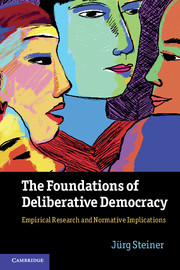Book contents
- Frontmatter
- Contents
- Figures
- Acknowledgments
- Introduction
- 1 Citizen participation in deliberation
- 2 Rationality and stories in deliberative justification
- 3 Common good and self-interest in deliberative justification
- 4 Respect in deliberation
- 5 Public openness of deliberation
- 6 Force of better argument in deliberation
- 7 Truthfulness in deliberation
- 8 Deliberation in the media and the Internet
- 9 Favorable conditions for deliberation
- 10 Favorable consequences of deliberation
- 11 The praxis of deliberation
- Appendix Newest version of Discourse Quality Index (DQI)
- Index
- References
6 - Force of better argument in deliberation
Published online by Cambridge University Press: 05 August 2012
- Frontmatter
- Contents
- Figures
- Acknowledgments
- Introduction
- 1 Citizen participation in deliberation
- 2 Rationality and stories in deliberative justification
- 3 Common good and self-interest in deliberative justification
- 4 Respect in deliberation
- 5 Public openness of deliberation
- 6 Force of better argument in deliberation
- 7 Truthfulness in deliberation
- 8 Deliberation in the media and the Internet
- 9 Favorable conditions for deliberation
- 10 Favorable consequences of deliberation
- 11 The praxis of deliberation
- Appendix Newest version of Discourse Quality Index (DQI)
- Index
- References
Summary
Normative controversies in the literature
When Jürgen Habermas postulates “the unforced force of the better argument,” he goes to the very core of the deliberative model. The essence of the statement is that political decisions should be based on good arguments. What constitutes a good argument is not a priori given but must be found out in mutual discussion where everyone has an equal voice. As John S. Dryzek puts it, “no individuals may possess authority on the basis of anything other than a good argument.” The controversy concerns the question of to what extent reasonable people can agree what the best arguments are and therefore what the probability of consensus is. Habermas expresses hope that consensus is possible when he writes that “consensus brought about through argument must rest on identical reasons that are able to convince parties in the same way.” Joshua A. Cohen also emphasizes that “ideal deliberation aims to arrive at a rationally motivated consensus.” Note that neither Habermas nor Cohen argue that deliberation will always lead to consensus; they merely express hope that this may be the case. In a pragmatic way, they also accept that sometimes consensus may be based on different reasons. Michael A. Neblo goes a step further in pointing out that in the interest of pluralism it may sometimes even be better if actors offer different reasons for a specific policy because this may lead to a more livelydebate. As an illustration he mentions that a coalition to eliminate agricultural subsidies for growing corn may mix those who support the measure primarily on grounds of economic efficiency and those who support it primarily out of environmental concerns. For Neblo there is nothing wrong from a deliberative perspective if such a coalition forms.
- Type
- Chapter
- Information
- The Foundations of Deliberative DemocracyEmpirical Research and Normative Implications, pp. 139 - 152Publisher: Cambridge University PressPrint publication year: 2012



